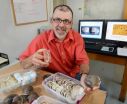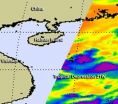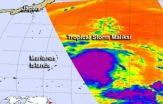The study showed that most overweight but healthy middle-aged and older adults who took omega-3 supplements for four months altered a ratio of their fatty acid consumption in a way that helped preserve tiny segments of DNA in their white blood cells.
These segments, called telomeres, are known to shorten over time in many types of cells as a consequence of aging. In the study, lengthening of telomeres in immune system cells was more prevalent in people who substantially improved the ratio of omega-3s to other fatty acids in their diet.
Omega-3 supplementation also reduced oxidative stress, caused by excessive free radicals in the blood, by about 15 percent compared to effects seen in the placebo group.
"The telomere finding is provocative in that it suggests the possibility that a nutritional supplement might actually make a difference in aging," said Jan Kiecolt-Glaser, professor of psychiatry and psychology at Ohio State and lead author of the study.
In another recent publication from this study, Kiecolt-Glaser and colleagues reported that omega-3 fatty acid supplements lowered inflammation in this same group of adults.
"Inflammation in particular is at the heart of so many health problems. Anything that reduces inflammation has a lot of potentially good spinoffs among older adults," she said.
Study participants took either 2.5 grams or 1.25 grams of active omega-3 polyunsaturated fatty acids, which are considered "good fats" that, when consumed in proper quantities, are associated with a variety of health benefits. Participants on the placebo took pills containing a mix of oils representing a typical American's daily intake.
The researchers say this combination of effects suggests that omega-3 supplements could represent a rare single nutritional intervention that has potential to lower the risk for a host of diseases associated with aging, such as coronary heart disease, Type 2 diabetes, arthritis and Alzheimer's disease.
The study is published online and scheduled for later print publication in the journal Brain, Behavior, and Immunity.
Participants received either the placebo or one of the two different doses of omega-3 fatty acids. The supplements were calibrated to contain a ratio of the two cold-water fish oil fatty acids, eicosapentaenoic acid (EPA) and docosahexaenoic acid (DHA), of seven to one. Previous research has suggested that EPA has more anti-inflammatory properties than DHA.
In the case of fatty acids, omega-3 supplementation alone doesn't tell the whole story of how this dietary change can affect health, explained Martha Belury, professor of human nutrition at Ohio State and a co-author of the study. Also important is the ratio of omega-6 fatty acids to omega-3 fatty acids that are present in a person's blood.
Omega-6 fatty acids come from vegetable oils, and since the 1960s, research has suggested that these oils, too, can help protect the cardiovascular system. However, the typical American diet tends to be heavy on omega-6 fatty acids and comparatively low in omega-3s that are naturally found in cold-water fish such as salmon and tuna. While the ratio of omega-6 to omega-3 fatty acids averages about 15-to-1, researchers tend to agree that for maximum benefit, this ratio should be lowered to 4-to-1, or even 2-to-1.
The long chains – or bigger molecules – that make up EPA and DHA fatty acids are believed to be the secret to their effectiveness, Belury said.
Both groups of participants who took omega-3 supplements showed, on average, lengthening of telomeres compared to overall telomere effects in the placebo group, but the relationship could have been attributed to chance. However, when the researchers analyzed the participants' omega-6 to omega-3 ratio in relationship to telomere lengthening, a lower ratio was clearly associated with lengthened telomeres.
"The idea we were looking at with the ratio of omega-6 to omega-3 fatty acids was an increase in the denominator to make the ratio smaller. In the United States, we need to focus on the omega-3 part because we don't get enough of those," Belury said.
The researchers also measured levels of compounds called F2-isoprostanes to determine levels of oxidative stress, which is linked to a number of conditions that include heart disease and neurodegenerative disorders. Both omega-3 groups together showed an average overall 15 percent reduction in oxidative stress compared to effects seen in the placebo group.
When the scientists revisited their earlier inflammation findings, they also found that decreases in an inflammatory marker in the blood called interleukin-6 (IL-6) were associated with telomere lengthening. In their earlier paper on omega-3s and inflammation, they reported that omega-3 supplements lowered IL-6 by 10 to 12 percent, depending on the dose. By comparison, those taking a placebo saw an overall 36 percent increase in IL-6 by the end of the study.
"This finding strongly suggests that inflammation is what's driving the changes in the telomeres," Kiecolt-Glaser said.
Telomeres are a hot topic in science, and their tendency to shorten is associated with such age-related problems as heart disease and early mortality. These short fragments of DNA act as caps at the end of chromosomes, and can be likened to the protective plastic at the end of a shoelace.
"If that plastic comes off, the shoelace unravels and it doesn't work anymore," said study co-author Ron Glaser, professor of molecular virology, immunology and medical genetics and director of the Institute for Behavioral Medicine Research (IBMR) at Ohio State. "In the same way, every time a cell divides, it loses a little bit of its DNA at the ends, and over time, that can cause significant problems."
Kiecolt-Glaser noted that this population was disease-free and reported very little stress. The study included 106 adults, average age 51 years, who were either overweight or obese and lived sedentary lives. The researchers excluded people taking medications to control mood, cholesterol and blood pressure as well as vegetarians, patients with diabetes, smokers, those routinely taking fish oil, people who got more than two hours of vigorous exercise each week and those whose body mass index was either below 22.5 or above 40.
"People who are less healthy than this group, and especially those who experience chronic stress, may gain even more benefits from omega-3 supplementation," she said.
###
Co-authors of the study include Elissa Epel, Jue Lin and Elizabeth Blackburn of the University of California, San Francisco; Rebecca Andridge and Beom Seuk Hwang of Ohio State's College of Public Health; and William Malarkey of the IBMR.
This work was supported in part by grants from the National Institutes of Health.
OmegaBrite, a company based in Waltham, Mass., supplied the supplements as an unrestricted gift but did not participate in the study design, results or publication. Study co-authors Blackburn, Epel and Lin are co-founders of Telome Health Inc., a telomere measurement company.
Contacts:
Jan Kiecolt-Glaser, (614) 293-3499; Janice.Kiecolt-Glaser@osumc.edu
Martha Belury, (614) 292-1680; Belury.1@osu.edu
Written by Emily Caldwell, (614) 292-8310; Caldwell.151@osu.edu
END




